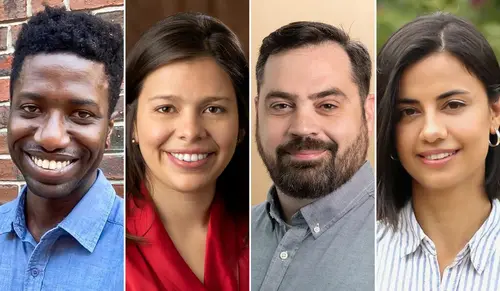Ezgi Yalcin is one of four Junior Faculty members to receive this year’s Poorvu Innovation Award

Text and photo by Yale News.
Four Yale faculty members — Nana Osei Quarshie, Ian Turner, Erika Valdivieso, and Meryem Ezgi Yalçın — have been named recipients of the 2023–24 Poorvu Family Fund for Academic Innovation award, an annual prize that recognizes innovative teaching.
The award, given to outstanding junior faculty members at Yale who have demonstrated excellence in teaching in undergraduate programs, enables them to dedicate the summer to research essential to their development as scholars and teachers.
The recipients, all of whom are members of Yale’s Faculty of Arts and Sciences, will be honored during an event to be hosted later this semester by Yale College Dean Pericles Lewis. The Yale Poorvu Family Fund for Academic Innovation is administered by the Yale College Dean’s Office.
“It’s such a pleasure to recognize these instructors’ gifts as teachers and the excellence they bring to the classroom,” said Lewis.
Nana Osei Quarshie is an assistant professor in the Program in the History of Science and Medicine. He is also affiliated with the Department of Anthropology and the Yale School of Medicine. An anthropologist and historian by training, he examines the relationship among mental healing, political expulsions, immigration, and urban belonging in West Africa since the seventeenth century. His research has been funded by the Chateaubriand Fellowship, the Social Science Research Council, the University of Michigan, and Yale University. He is currently revising his first monograph, “An African Pharmakon: Psychiatry and the Mind Politic of Modern Ghana.” He teaches interdisciplinary courses on various subjects, including African systems of thought, global histories of confinement, decolonizing the mind, and history beyond the archive.
Ian Turner is an assistant professor of political science. He is also a resident fellow in the Institution of Social and Policy Studies and the Center for the Study of American Politics, and a fellow in the Leitner Program in International and Comparative Political Economy. He is broadly interested in topics in American politics, political institutions, political economy, and public administration. His research focuses on how political institutions affect democratic accountability and representation with a focus on bureaucratic politics and special interest politics. He teaches courses on game theory and formal modeling in the social sciences as well as bureaucratic politics, special interest politics, and American political institutions.
Erika Valdivieso, an assistant professor of classics, specializes in Latin poetry, book history, and the legacies of classical humanism in colonia Latin America. Her research and teaching draw attention to the connections between literary imagination and Latin learning. Her book “Empire’s Companion: Virgilian Epics from the Americas” shows how New World epics repackaged notions of empire from the Roman poet Virgil. Students in Valdivieso’s classes are invited to explore the reception of Greco-Roman antiquity beyond Europe and to consider diverse perspectives on the ancient past. While at Yale she has taught a first-year seminar on forgeries and a section of Directed Studies, as well as introductory and advanced Latin classes in the department.
Meryem Ezgi Yalçın is the director of and a lector in the Modern Turkish Program in the Department of Near Eastern Languages and Civilizations, where she teaches Turkish at all levels. An applied linguist with over a decade of experience in teaching methods, she focuses on the social and individual variables in the acquisition of Turkish as a world language. She is currently teaching task-based and content-based language courses, drawing on the multiliteracies approach, and providing her students with hands-on experience of Turkish culture, including Turkish cinema, cuisine, and art. In her role as program director, Yalçın is responsible for curriculum and assessment design and development. To address learners’ individual needs, she introduced technology-enhanced flipped course design, which allows students to learn certain parts of the course at their own pace and focus on interaction during the face-to-face class time.